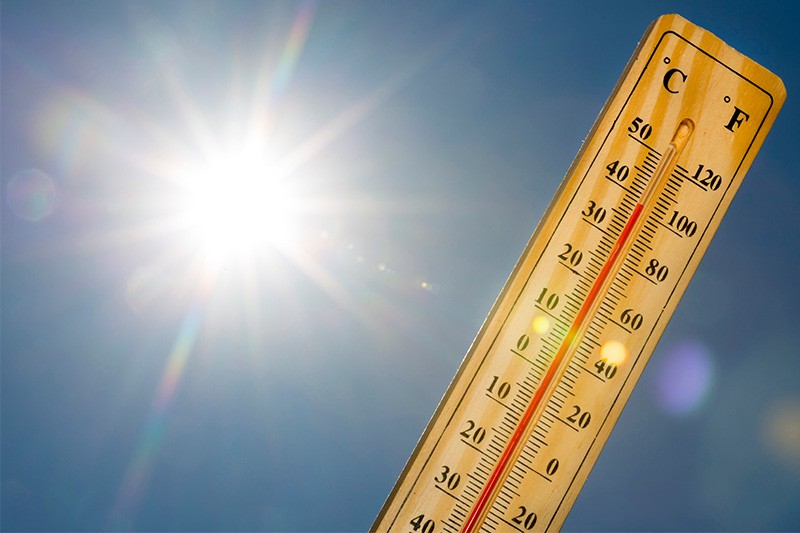
Heat waves in the U.S. kill more people in their homes than anywhere else
UC nursing professor speaks with The Cincinnati Enquirer about heat-related deaths
Summer is officially here.
The Summer Solstice began on Thursday, June 20, 2024, but for many of us the hotter than normal temperatures would suggest The Old Farmer’s Almanac is a bit late with its announcement.
Millions of Americans are battling a punishing heat dome that has settled over the northeastern United States creating the potential for record-breaking high temperatures this week that stretch from the Queen City in Cincinnati to Portland, Maine.
That puts some populations - households without air conditioning - at grave risk.
The Cincinnati Enquirer conducted an analysis of National Weather Service data and found that almost half the 3,142 people who died from heat-related ailments in the past 20 years died at home. Many people who die in heat waves lack air conditioning or have health problems that can be fatal in excessive heat, the Enquirer found.

Associate Professor Tasha Turner-Bicknell
Tasha Turner-Bicknell, an associate professor in the UC College of Nursing, spoke with the Enquirer about its findings. She is also director of advanced public health nursing programs at UC.
“When the weather gets this extreme, there's a definite risk,” Turner-Bicknell, told the Enquirer.
She says lack of air conditioning in the home is a factor for so many people dying of these heat-related deaths.
“Most of us take for granted that we live and work in air-conditioned environments,” she explains. "But we have a lot of members of our community that do not have air conditioning.”
Social isolation can be especially dangerous for those with disabilities or mobility-restrictions, according to Turner-Bicknell, who rely on others to leave their homes.
“Maybe they use a walker or a cane or a wheelchair, and maybe their caregivers are not available," she says. "They might be unable to get out of their house without assistance.”
Read the full Cincinnati Enquirer story online.
Learn more about Associate Professor Tasha Turner-Bicknell online.
Related Stories
Mural by UC grad honors U.S. military history
July 17, 2024
Local 12 highlighted a new mural by University of Cincinnati graduate and artist Brandon Hawkins that pays tribute to U.S. military history.
Social media fuels extreme political rhetoric
July 17, 2024
UC College of Arts and Sciences Professor Jeffrey Blevins tells Local 12 that online algorithms fuel political polarization on social media.
Camp aims to empower children, teens who stutter
July 17, 2024
A one-week, evidence-based program for children and teens who stutter at the University of Cincinnati will teach kids to communicate effectively, advocate for themselves and develop confidence about their communication abilities. Camp Dream. Speak. Live., which is coming to Cincinnati for the first time July 22-26, began in 2014 at the University of Texas at Austin. The Arthur M. Blank Center for Stuttering Education and Research at UT expects to serve more than 2,000 children at camps across the United States, Africa, Asia and Europe this year.
From intern to full-time: Recent Lighting Design grad joins Bandit Lites
July 16, 2024
Lighting & Sound America spotlights recent graduate Riley Rowan's new position at Bandit Lites, a full-service design, management and producer of live events and entertainment.
CCM alum Donald Lawrence to be inducted into Cincinnati Black Music Walk of Fame
July 16, 2024
UC College-Conservatory of Music alumnus Donald Lawrence is part of the 2024 class of Cincinnati Black Music Walk of Fame inductees. Located at the Banks in downtown Cincinnati, the induction ceremony on July 27 will feature a parade of stars and a free concert by the Zapp Band.
U.S. stroke survival is improving, but race still plays role
July 16, 2024
U.S. News & World Report, HealthDay and Real Health covered new research from the University of Cincinnati that found overall rates of long-term survival following stroke are improving, but Black individuals experience worse long-term outcomes compared to white individuals.
Presidential challenge to UC: Join Ride Cincinnati to fight cancer
July 16, 2024
UC President Neville Pinto has again challenged every UC college and unit to send at least one rider to the September 14 Ride Cincinnati event to help fundraise for cancer research and cancer care. UC students ride free. Signup by July 31 for free UC-branded cycling jersey.
Pediatric ICU rates linked to housing quality, income, education
July 16, 2024
Healio highlighted research led by the University of Cincinnati and Cincinnati Children's Hospital's Carlie Myers that found a link between pediatric ICU admission rates and housing quality, household income and education.
UC study: Long-term stroke survival improving, but racial disparities remain
July 15, 2024
New research from the University of Cincinnati published in the journal Neurology found long-term survival rates following acute ischemic strokes are improving, but Black individuals experience worse long-term outcomes compared to white individuals.
How to deal with workers' summer slumps
July 15, 2024
A summer slump featuring a loss in the quantity and quality of work is common, and instead of fretting about it, organizations should just roll with it, a University of Cincinnati business professor told Orlando, Florida-based WKMG's Breakfast With Bridgett. Scott Dust, PhD, the Fealy Family Chair in Entrepreneurship and an associate professor in the Department of Management at the Carl H. Lindner College of Business, said summertime changes people's psyches.
